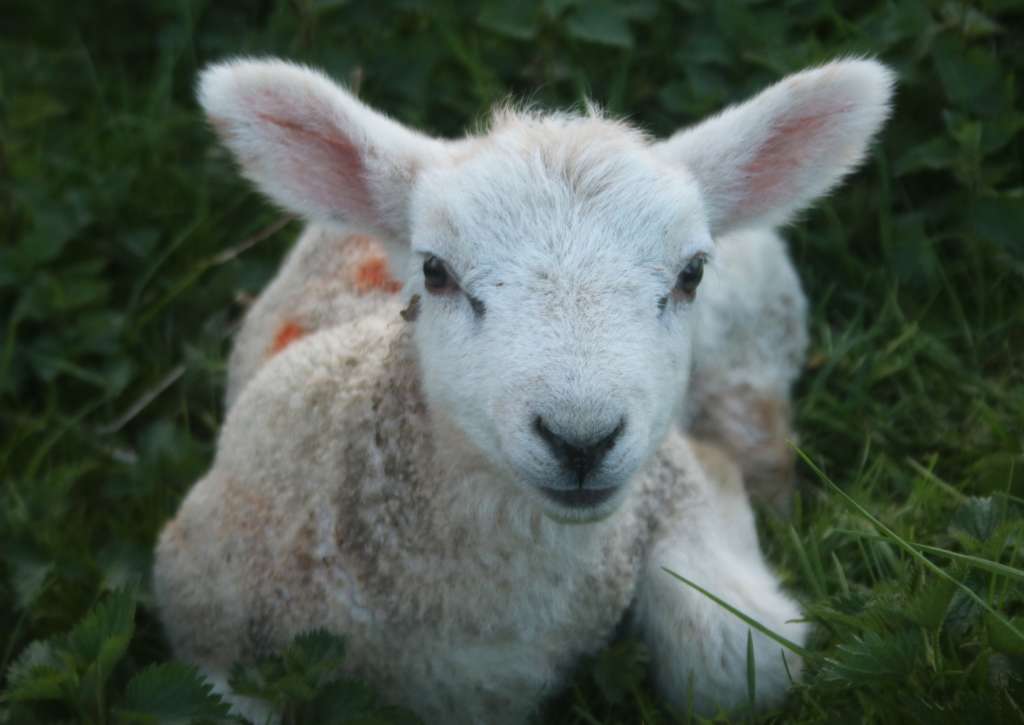Throughout the ages, society has drawn on a unique class of poets and authors. These are people who craft fables and spin short stories that have moral messages, especially for children and the otherwise illiterate and unlearned peasants of their age. The most famous, without a doubt was Aesop, and his fables are taught to children even today. What child has not heard of the Tortoise and the Hare, from which they learn perseverance? Less known to American audiences is Jean de La Fontaine (July 8, 1621 – April 13, 1695.) The Wolf and the Lamb is the subject of the blog.
Not an easy job
It was not easy choosing one of La Fontaine’s poems to spotlight on a Christian blog, because his topics feature either raunchy individuals (like two guys sleeping with the same woman and nine months later trying to figure out who her baby resembles the more) or the “storyline” is somewhat brutal (at least as far as children are concerned.) No more brutal, however, than the witch in the woods who wants to roast Hansel and Gretel in her Starlite 36 Inch 5.04 cu. ft., auto capacity, gas infused, dutch door, double wall oven (currently on sale at a number of appliance stores near you.)
I did find one poem by La Fontaines, Le Loup et L’Agneau (“The Wolf and the Lamb”) that is useful today. To avoid copyright infringement, I cannot reproduce the poem in its entirety here. You can find the somewhat short poem in English here on Fariba’s webpage.
“People who get away with saying and doing the most ludicrous things are those who have the most power in our society.”
La Fontaine’s Le Loup et L’Agneau
According to Fariba, herself a blogger and one of my primary sources for this post, “French fables do not teach children how the world should be but how it really is. Consequently, children are forced to confront the injustices of the world from a young age.” Consider one of our country’s greatest social injustices (slavery.) When I was a small child and wanted to learn about black folks in the ante-bellum and post-bellum South, I was referred to Uncle Remus and Brer Rabbit stories. Reading about children my age in bondage was not appropriate in my household.
La Fontaine’s technique
For those readers who never heard of or read La Fontaine, Fariba notes: “In most La Fontaine fables, the first line is the moral. The first line of Le Loup et L’Agneau reads ‘The reason of the strongest [person] is always the best.'” Not because it makes sense or it’s fair in any way, shape or form, but because “People who get away with saying and doing the most ludicrous things are those who have the most power in our society.”
In this poem, a hungry wolf and a lamb approach a stream of water at the same time to refresh themselves. But the wolf, most likely looking for a pretense to pounce on the lamb, accuses the lamb of muddying the water that the wolf was drinking. The lamb points out respectfully to the wolf that it is quite impossible for him (the lamb) to do that, given that the wolf is upstream from where the lamb is. When caught in this lie, the wolf snaps back with another lie to the lamb. Author Marketa Goetz-Stankiewicz explains it this way: “Overwhelmed by the radiance of truth, the wolf has to change his tactics. Instead of dwelling on the present, he reverts to the past, and introduces history as, albeit, false witness”: “Six months ago, you cursed me.” The lamb replies to the wolf that six months ago he (the lamb) was not even born, so how could that be true? The wolf growling finally says: “It must have been your father” and he pounces on the poor frightened lamb and proceeds to eat the creature.
“Overwhelmed by the radiance of truth, the wolf has to change his tactics. Instead of dwelling on the present, he reverts to the past and introduces history as, albeit false, witness,”
Marketa Goetz-Stankiewicz.
This “might makes right” is found elswhere in literature and history, particularly in stories about King Arthur. Closely related might be the notion we have today that it is the victor that writes history, so war crimes are in a sense, like beauty, in the eye of the beholder. No doubt if the U.S. and our allies had lost the Second World War, Eisenhower, Montgomery, Bradly, Patton, MacArthur, et al. might have been put on trial as war criminals. Certainly Churchill. Und wir würden alle deutsch sprechen.
The lamb is helpless in this scenario, and has no recourse. Thucydides, the first political scientist in history once said that in this world, the strong do what they will and the weak suffer what they must. All the lamb can do is refute the wolf’s lies, but the wolf uses lies as a pretext to disguise his true intent.

To he who has ears to hear
There are warnings in this poem, not only for Christians today, but for anyone who cares for our Constitutional Republic and our democractic ideals, for it was Plato who in 380 B.C. asked: “Does not tyranny spring from democracy?” We have politicians on the public stage who lie incessantly. I’m not referring to those who have broken their often extravagent campaign promises while running for election. I’m talking of those politicians who deliberately bear false witness against others, who practice character assassination, who ruthlessly demonize entire populations of people in this nation and brand them as the “enemy” and “traitors,” “fascists” or “socialists.” Nor, am I accusing anyone in particular, but rather applying this fable to human nature and the winds that are blowing through our body politic at the moment. As nineteenth century Sir John Dalberg-Acton remarked, “Power tends to corrupt, and absolute power corrupts absolutely.” The framers knew this before Dalberg-Acton was born, and they gave us divided government.
“Does not tyrany spring from democracy?”
Plato, 380 B.C.
These people I warn about are those who would behave as a wolf, blind to reason because these persons can get away with whatever they want, and say whatever they like, with no accountability or consequence. Such people as these can even “make war against the saints . . . to conquer them” if that serves their ends (Revelation 13:7.) God forbid they just might.
But these wolves might also be false teachers in the Church, or people with ulterior motives and hidden agendas (Jude 1:4: “For certain individuals whose condemnation was written about long ago have secretly slipped in among you. They are ungodly people, who pervert the grace of our God into a license for immorality and deny Jesus Christ our only Sovereign and Lord.”) Like some of the more well known cults (Peoples’ Temple, Heaven’s Gate, and Aum Shinrikyo), there is often a tragic ending, resembling something out of Wagner. This is why we must follow the advice of Jesus. In Matthew 10:16 “Behold, I send you out as sheep in the midst of wolves; so be shrewd as serpents and innocent as doves.”
Else someone may be having you for lunch.
Feature photo: NEOS1AM (Shutterstock.)





telegra.Ph
December 16, 2023Great article, exactly what I wanted to find.
louise kaskel
May 19, 2024This is so pertinent to what we are witnessing. Excellent article!